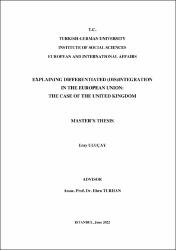Explaining differentiated (dis)integrationin the European Union : the case of the United Kingdom
Citation
Uluçay, Eray (2022). Explaining differentiated (dis)integrationin the European Union : the case of the United Kingdom. Türk-Alman Üniversitesi, Sosyal Bilimler Enstitüsü, İstanbul.Abstract
Farklılaştırılmış entegrasyon, uzun yıllardır Avrupa entegrasyonun normal bir özelliği
olmuştur. Birleşik Krallık, Avrupa Birliği’ndeki farklı politika alanlarından bir dizi opt out (dışında kalma) ile farklılaştırılmış entegrasyonun dikkate değer bir örneğiydi. Brexit
süreci ile birlikte Birleşik Krallık Avrupa Birliği’nde farklılaştırılmış dezentegrasyon
sürecini başlatan ilk üye devlet olmuştur. Bu bağlamda ‘‘farklılaştırılmış entegrasyon
dezentegrasyona nasıl yol açtı’’ sorusu ortaya çıkmıştır. Birleşik Krallık hem
farklılaştırılmış entegrasyonu hem de farklılaştırılmış deneyimleyen tek üye devlet
olduğundan, bu tez Birleşik Krallık hakkında bir vaka analizine dayanmaktadır. Ampirik
olarak, Avrupa Birliği Antlaşmasının 50. Maddesinin yürürlüğe girmesine kadar Birleşik
Krallık’ın Avrupa Birliği ile farklılaştırılmış (dez)entegrasyon tarihini incelemiştir.
Teorik olarak, bu tez farklılaşma çerçevesinde entegrasyonu ve dezentegrasyonu yan
yana koymaktadır. Entegrasyondan dezentegrasyona yumuşak geçişi açıklamak amacıyla
aynı zamanda ‘‘farklılaştırılmış (dez)entegrasyon nasıl oluşur’’ sorusunu da sormuştur.
Bu tez bir üye devlet farklılaştırılmış entegrasyonu ne kadar çok deneyimlerse,
dezentegrasyonu talep etme olasılığının o kadar yüksek olduğunu savunmaktadır. Ayrıca,
ulusal çıkarlara yönelik artan endişenin Birleşik Krallık’ın farklılaştırılmış entegrasyon
deneyimi yaşamasına neden olduğunu ve bunun da dezentegrasyona yol açtığını iddia
etmektedir. Differentiated integration has been a regular feature of European integration for many
years. The United Kingdom was a notable example of differentiated integration with a
number of opt-outs from different policy areas within the European Union. With the
Brexit process, the United Kingdom became the first member state to trigger to process
of differentiated disintegration in the European Union. Within this context, the question
of ‘‘how differentiated integration led to disintegration’’ arose. As the United Kingdom
was the only member state which experienced both differentiated integration and
differentiated disintegration, this thesis is based on a case study of the United Kingdom.
Empirically, it examined the United Kingdom’s history of differentiated (dis)integration
with the European Union until the invocation of Article 50 Treaty on European Union.
Theoretically, this thesis juxtaposed integration and disintegration within the framework
of differentiation. It also asked the question of ‘’how differentiated (dis)integration
occurs’’ with the purpose of explaining the smooth transition from integration to
disintegration. This thesis asserts that the more a member state experiences differentiated
integration, the more likely it would demand for disintegration. Moreover, it claims that
the growing concern over the national interests made the United Kingdom experience
differentiated integration, paving the way for disintegration.
Collections
- Tez Koleksiyonu [46]

















